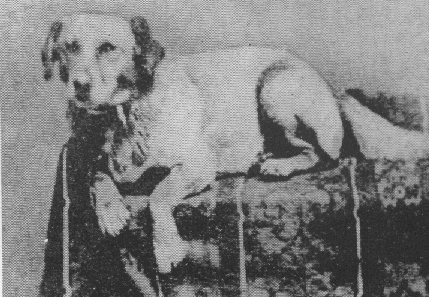
This Thursday is the 200
th birthday of both Charles Darwin and Abraham Lincoln. Everyone knows that both Darwin and Lincoln are figures of unmatched historical importance in our culture. The coincidence of their birth has been a point of interest for biographers who have noted a number of parallels in their lives, and on this subject, a brief article today in
The Chicago Tribune is a nice read. More to the point of this post, a bit of web surfing reveals, not surprisingly, that both men were lovers of animals, and were lovers of dogs especially.
In Darwin's case, he showed an affinity for dogs and a talent for naturalistic observation in his youth. Although family status and tradition compelled the young Charles to begin studying for a career in medicine, he soon abandoned that course to the disappointment of his father. Darwin recalled his father once telling him that "You care for nothing but shooting, dogs, and rat-catching, and you will be a disgrace to yourself and all your family." Years after Darwin's legendary voyage aboard the
HMS Beagle, the traits of domestic dogs figured prominently in Darwin's writings on evolution by natural selection (as notably evident from the first chapter of his landmark book,
On The Origin of Species), and domestic dogs' behavioral traits provided much of the material from which Darwin developed his thoughts concerning
The Expression of Emotion in Man and Animals.
Although Lincoln is obviously more celebrated for his statesmanship and heroism in matters of politics and human rights, he was certainly a good friend of animals. There is a
story of how a young Lincoln waded barefoot through icy waters to
rescue his dog during a family relocation trip. In another story recounted by historians, the newly elected president decided that his dog
Fido would best be left in the care of family friends in Springfield, Illinois, instead of taking him to Washington. For the dog's comfort, the Lincoln family left their
horsehair sofa for Fido to use in his new home. He is thought to have been the first dog of a president to be photographed (photo at top of post). After Lincoln was assassinated, Fido watched the funeral procession in Springfield. Tragically, within a year, Fido met with a violent death when he was stabbed by a drunk man who was enraged at the dog for having dirtied his clothing.
Biographers note that Darwin was an
opponent of slavery, and that from his home in Britain he followed the news from the U.S. pertaining to Lincoln's presidency and the conflict between the states. Lincoln, conversely, appears not to have expressed much awareness of Darwin's work. Nevertheless, according to Lincoln's law partner, Lincoln read with interest some earlier writings from another naturalist who had theorized the evolution of species, though the mechanism of natural selection had not yet been well described in the literature before Darwin. We do not know whether the concept of evolution influenced Lincoln's politics, but
historians might consider that question to be a bit narrow. What is more important is that the works of Darwin and Lincoln marked a change in the perception of man's place in nature. The views among naturalists and statesmen began to shift away from a position in which humans are "above" nature (and one race considered to be "above" another), and moved closer to a view of humans as
part of nature along with other animals. The shift continued through the twentieth century, and is continuing today, and it is the legacy of two great lovers of dogs.
It is scarcely possible to doubt that the love of man has become instinctive in the dog.- Charles Darwin
I care not for a man's religion whose dog and cat are not the better for it.- Abraham Lincoln
.





.3-15-09.jpg)






















